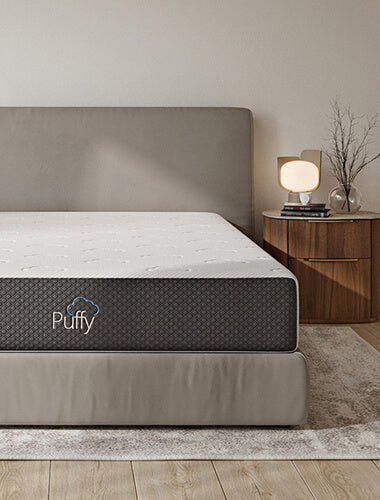

+ FREE PUFFY PILLOWS





A mattress is a significant investment, especially since we spend about one-third of our life either sleeping or attempting to do so. The quality of your mattress can make a huge difference in your sleep quality and life. It can give you restful deep sleep or keep you turning and tossing all night. But how long does a mattress last?
There isn’t a set rule as to how long your mattress lifespan is but a mattress should last for an average of 7 to 10 years. However, this isn’t the case with every mattress. This article goes through the factors that define the longevity of your mattress, the signs you need a replacement, and how to prolong your mattress’s durability.
We all want a mattress that lasts a lifetime but things like how often you use it, the quality of the mattress, and who is sleeping on it will define how long a mattress lasts. Below we’ve dived into each factor further:
So, how long does a mattress last, exactly? The answer depends on how often you use it. Most of us sleep on our mattresses every night, but if you travel for work or have a mattress in your guest room, it might last longer. Additionally, if you usually eat, read, or watch TV in bed as well as sleep, it’ll affect your mattress lifespan. This is why it’s important to try and limit your activities to just sleeping in bed.
The number of sleepers on the bed, their weight, and even their sleeping positions will make a difference in how long a mattress lasts. Your sleeping position will eventually create indentations in the mattress, especially if you’re a side sleeper or a back sleeper. You’ll notice excessive sagging in the hip section of the mattress. For heavy sleepers, mattresses made of low-density memory foam will sink in and sag prematurely. For heavy sleepers, experts usually recommend high-density memory foam or latex mattresses.
The quality of the materials used in a mattress also affects its longevity. For example, an air mattress or a water bed wouldn’t last past two years, even less if it gets torn. Low-density foam mattresses also have a lower lifespan than high-density foam mattresses because they sag quickly with the sleeper’s shape. A second-class mattress that you bought without really thinking about wouldn’t compare to a luxurious mattress that you invested in. You need to ask yourself - is this mattress sustainable?
While the standard lifespan of a mattress can range from 7 to 10 years, this may differ depending on the mattress type. The most popular mattress types are innerspring, memory foam, hybrid, or latex mattresses. Latex mattresses are known for their durability because of their firm build but they’re not the most comfortable mattresses, especially if you suffer from back pain.
This is followed by memory foam mattresses, which have an average lifespan of 10 to 12 years because they return to their original shape when the pressure of a body is removed. With proper care, a memory foam mattress can last for a decade or more. Hybrid mattresses combine memory foam and innerspring mattresses, offering the best of both worlds. They have an average lifespan of seven to eight years. However, if you’re above 50, you may need to change your mattress from 5 to 7 years to eliminate pressure points faster and reduce stiffness when you wake up.
Lastly, an innerspring mattress has the shortest lifespan with six years. The coils will lose tension with time or they could break or poke out, which will make the mattress sag and uncomfortable.

A high-quality mattress should offer comfort, support, and proper spine alignment while you sleep. It should conform to the body and reduce strain on key pressure points. On the contrary, a bad mattress can cause back and neck pain, stiffness, and make you wake up feeling tired and grumpy the next morning. It’ll be uncomfortable and will promote regular body aches - a worn out mattress can also lead to sleep deprivation.
Your mattress plays a huge role in your sleep quality and duration, which will as a result affect your productivity and energy levels during the daytime. Getting restful sleep is important to your mental and physical health.

Now that we know how long a mattress lasts, let’s find out if you need a new one! A study was done comparing the sleep quality and comfort of men and women who’ve changed their mattresses and beddings. They have no previous history of disturbed sleep. The comparison tracked back and shoulder pain, sleep quality, comfort, and efficiency. The results showed a significant improvement between both cases, such as reduction of pain and stiffness as well as more comfort and quality sleep.
Here are all the signs that it’s time for a new mattress:
Instead of asking yourself, how long does a mattress last? you can take active steps to preserve your mattress and increase its lifespan.
You’ll be able to tell if your mattress is hurting your back if you wake up in the morning with back pain or soreness. You’ll also have difficulty sleeping and will be tossing and turning all night. This means it’s time for a mattress replacement.
If you’re wondering how long does a mattress last, it depends on multiple factors like how often you sleep on it, the number of sleepers, their weight and sleeping positions, and the quality of the mattress. A mattress can be comfortable for up to 10 years if taken care of properly.
The average lifespan of a mattress is from 7 to 10 years. However, this is affected by things like usage, the number of sleepers, and the type of mattress. Some mattresses have a higher lifespan than others, like a memory foam mattress or a hybrid mattress.
In the end, knowing how long a mattress lasts shouldn’t make a difference with how you care for it. It can last for 5 years, 7 years, or even a decade. But it’s important to always be comfortable on your mattress as it plays an important role in your sleep quality.
Puffy offers an extended 101-night trial period so you’d be able to test your mattress in the comfort of your own home and ensure it’s right for you.
Shop the best-rated mattress with these extra comfy benefits: